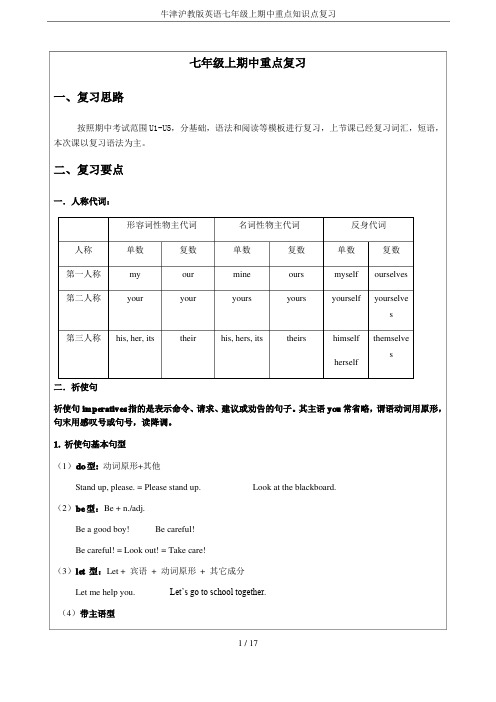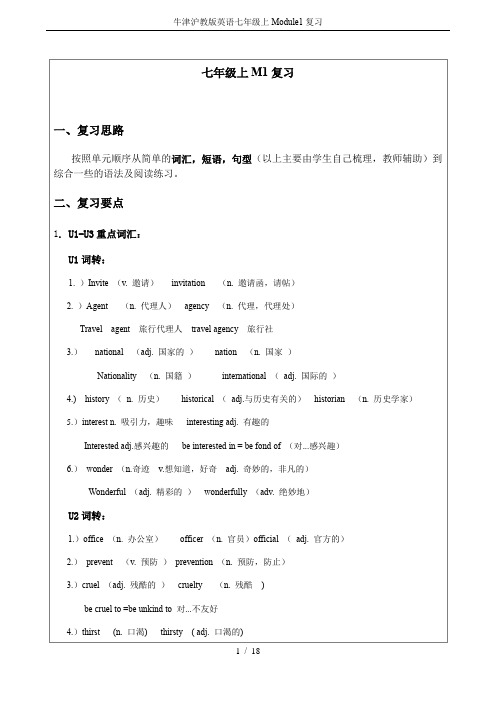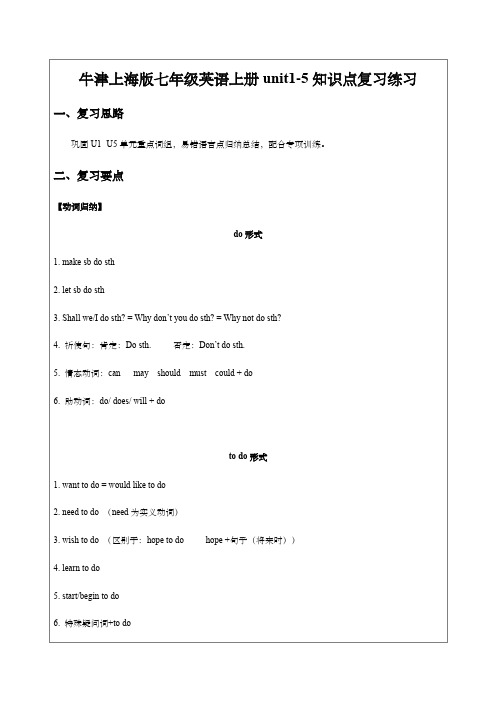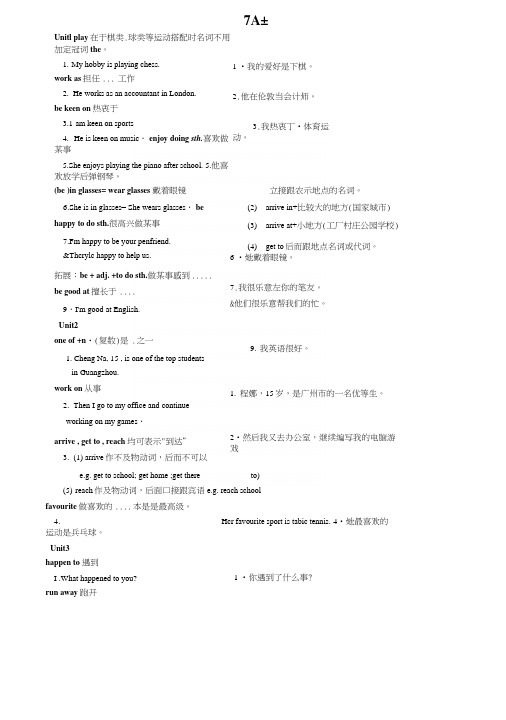英语(上海牛津版)复习资料[七年级上]
2024秋沪教牛津新七年级英语上册知识点清单(背诵版)

2024秋沪教牛津新七年级上知识点清单handout(背诵版)Unit 1 Friendship重点词汇一、词性分类1.Nounsguitar吉他courage勇气;胆量friendship友谊;朋友关系admiration钦佩;赞赏respect尊敬;尊重support支持;鼓励trust信任;信赖survey调查quality品质;品德appearance外貌thought想法end 结局heart心2. verbsimprove改进;改善describe描述;形容rise 上升3. adjectiveshonest诚实的patient有耐心的confident自信的;有自信心的personal个性的caring 关心他人的;体贴人的straight直的dark褐色的;乌黑的same同—的;相同的basic基本的;基础的glad高兴的;愉快的4. adverbshowever然而二、词性转换1. courage n.勇气;胆量—encourage v.鼓励2. admiration n.羡慕;钦佩—admire v.羡慕;钦佩3. respect n.尊敬;尊重—respectful adj.表示敬意的;尊敬的4. support v.支持—supportive adj.支持的;鼓励的5. trust n.信任—trustful adj.轻信的trustworthy adj.值得信赖的6. appearance n.外貌;出现—appear v.出现;显得;似乎7. improve v改进;改善—improvement n.改进;改善8. describe v描述—description n.描述9. honest adj.诚实的—honesty n.诚实—dishonest adj.不诚实的10. patient adj.有耐心的—patience n.耐心impatient adj.没有耐心的11. confident adj.自信的;有信心的—confidence n.信心三.一词多义1. respect n.& v尊敬;尊重 3. trust n. & v.信任;信赖2. support n.& v支持;鼓励 4..straight adj.直的adv.笔直地;径直重点短语1. be good at擅长10. watch over照管;监督2. turn to sb. for help向某人求助11. rise into 上升到3. after school放学后12.cry out大叫;叫喊4. be willing to do 愿意做某事13. cry oneself to sleep哭着入睡5. thanks to多亏了14. wake up醒;醒来6. count on依靠(=depend on)15. come and go来去7. medium height中等身高16. take somebody's place替代某人8. modern dance现代舞17. come along 出现9. take care of照顾(= look after / care for)核心句式1. What do you like doing?你喜欢做什么?2.Li Hua is helpful and patient.李华乐于助人且有耐心。
牛津沪教版英语七年级上期中重点知识点复习

七年级上期中重点复习一、复习思路按照期中考试范围U1-U5,分基础,语法和阅读等模板进行复习,上节课已经复习词汇,短语,本次课以复习语法为主。
二、复习要点一.人称代词:人称第一人称第二人称形容词性物主代词单数my your复数our your名词性物主代词单数mine yours复数ours yours反身代词单数myself yourself复数ourselves yourselves第三人称his, her, itstheirhis, hers, itstheirshimself herself二.祈使句祈使句imperatives 指的是表示命令、请求、建议或劝告的句子。
其主语you 常省略,谓语动词用原形,句末用感叹号或句号,读降调。
1.祈使句基本句型(1)do 型:动词原形+其他Stand up, please. = Please stand up.Look at the blackboard.(2)be 型:Be + n./adj.Be a good boy!Be careful!Be careful! = Look out! = Take care!(3)let 型:Let +宾语+动词原形+其它成分Let me help you.Let’s go to school together.(4)带主语型themselvesYou, Jim, go to my office after class.You boys read the first part.2.祈使句的否定(句型转换)(1) Don't +动词原形Don't stand up.Don't be careless.Don't let them play with fire.(2)Let型的否定式有两种“:Don't + let +宾语+动词原形+其它成分and“Let +宾语+ not +动词原形+其它成分”。
牛津上海版七年级英语上册Unit1-2重点知识复习及强化练习

——Yes, I used to.(No,I usedn't.) 是的,经常打。(不,不常打。)
二、区分 be used to 与 used to
1、be used to 意为“习惯于”,其中的 to 是介词,所以其后要接名词或动名词(不能接动词原形);若要强调 从不习惯到习惯的过程,可用 get, become 等代替动词 get, become be。如:
He is used to looking after himself. 他已习惯于自己照顾自己。
I’m sure I’ll get used to the hard work. 我相信我会习惯这艰苦工作的。
2、used to 意为“过去经常”,其中的 to 是不定式符号,而不是介词,所以其后只接动词原形(不能接动名 词)。如: He used to live in Paris. 他过去一直住在巴黎。
Did you use to go swimming in the river when you were young? 你小时候经常在河里游泳吗?
Used he go to school by bike? 他过去骑车上学吗?
4、used to 用于省略句时,肯定式保留 to,否定式不保留 to。例如:
convenient
choose a flat in the center of have a nice view face
19. I want to ________ ________New York.
20. Let's ________ all the things we are going to buy.
牛津沪教版英语七年级上Module1复习

七年级上M1复习一、复习思路按照单元顺序从简单的词汇,短语,句型(以上主要由学生自己梳理,教师辅助)到综合一些的语法及阅读练习。
二、复习要点1. U1-U3重点词汇:U1词转:1. )Invite (v. 邀请)invitation (n. 邀请函,请帖)2. )Agent (n. 代理人)agency (n. 代理,代理处)Travel agent 旅行代理人travel agency 旅行社3.)national (adj. 国家的)nation (n. 国家)Nationality (n. 国籍)international (adj. 国际的)4.) history (n. 历史)historical (adj.与历史有关的)historian (n. 历史学家)5.)interest n. 吸引力,趣味interesting adj. 有趣的Interested adj.感兴趣的be interested in = be fond of (对...感兴趣)6.)wonder (n.奇迹v.想知道,好奇adj. 奇妙的,非凡的)Wonderful (adj. 精彩的)wonderfully (adv. 绝妙地)U2词转:1.)office (n. 办公室)officer (n. 官员)official (adj. 官方的)2.)prevent (v. 预防)prevention (n. 预防,防止)3.)cruel (adj. 残酷的)cruelty (n. 残酷)be cruel to =be unkind to 对...不友好4.)thirst (n. 口渴) thirsty ( adj. 口渴的)5.)love (n. 爱) lovely ( adj. 可爱的)6.)care (n.照顾) careful (adj. 小心的) carefully ( n. 小心地)Careless (adj. 粗心的) carelessness ( n. 粗心)7.) safe (adj. 安全的) save (v.拯救)safely (adv. 安全地) Safety (n. 安全)8.)police n.警方policeman n.警察policewoman n. 女警察9.) miss v.思念,错过missing adj. 失踪的10.)hunt v. 猎取hunter n. 猎人U3词转:1.)foreign adj.外国的foreigner n. 外国人2.)crowd n.人群crowded adj. 拥挤的be crowded with 挤满...3.)weigh v-weight n. 称v. -重量n.high a-height n 高的a. -高度n.4.)Germany –German(s) 德国-- 德国的,德国人Canada - Canadian(s)加拿大- -加拿大人America-American(s)美国- -美国人Britian - British 英国- - 英国人India -Indian (s)印度- -印度人Australia -Australian(s)澳大利亚- - 澳大利亚人Japan-Japanese 日本--日本人China - Chinese 中国--中国人2. U1-U3重点短语:at the SPCA 在动物保护协会cruel – cruelty 残忍be cruel to sb. 对..残忍.prefer A to B = like A better than B 比起B来更喜欢Aprefer doing A to doing B 比起做B来更喜欢做Aprefer – preferred 更喜欢prefer …= like… better 更喜欢…be in danger 处于险境be dangerous to 对...危险care for = take care of =look after 照顾,照看don’t need to do sth. / needn’t do sth. / don’t have to do sth. 不必做某事be kind to sb. be unkind to sb. 对…和蔼可亲对…不友善help sb. do sth. / help sb. with sth. 帮助某人做某事promise (not) to do sth. 承诺(不)做某事help sb. by doing sth. 通过做某事来帮助某人raise money for … 为…筹钱be useful to ... 对…有用in different ways 用不同的方法on the farm 在农场save v. –safe a. –safely ad. – safety n. 挽救v. 安全的a. 安全地ad. 安全n. take care of = look after=care for 照顾keep warm 保暖need to do sth. 需要去做某事否定句don’t need to doBe kind/friendly to sb 对…友好hold …..carefully with both hands 用双手小心地抱着buy sth for sb 为某人买某物save animals from danger 拯救动物免受危险help sb do sth 帮助某人做某事sick animals 生病的动物keep people safe from danger 保护人们安全免受危险hunt animals for food 猎杀动物获取食物should do 应该做某事on their farms 在他们的农场里bring sth to sb 把某物带给某人be crowded with / be filled with / be full of 挤满了,充满了read about sth. 阅读与…有关的…know about sth. 了解…19. be interested in 对…感兴趣make friends with … 和…交朋友like doing sth. / enjoy doing sth. / be interested in doing sth. 喜欢做某事tell sb. about sth. 告诉某人某事look forward to doing sth. 盼望做某事hear from sb. = get a letter from sb. = receive a letter from sb. 收到某人的来信most of 大多数near = close to 在…. 附近far away from = far from 远离ride bicycle 骑自行车enjoy yourself = have a good time 玩得愉快Help yourself to sth 随便吃……be crowded with 挤满crowd 人群call sb. sth 把某人称作… be near… 靠近be far (away) from…远离write (a letter) to sb. 写信给某人know about 了解know 知道show interest in… interest n. 兴趣3. U1-U3重点语法点:现在完成时:一、定义:表示过去发生或已经完成的某一动作对现在造成的影响或结果。
牛津上海版七年级英语上册unit1-5知识点复习练习

4. Many foreign _______________ want to know the history of China. (tour)
5. There are a lot of tall _______________ in the city. (build)
5. Tom, your bedroom is _______________. You must tidy it up. (tidy)
6. There is not much to _______________ between the two cell phones. (choice)
3. wish to do(区别于:hope to do hope +句子(将来时))
4. learn to do
5. start/begin to do
6.特殊疑问词+to do
how to play the piano where to go what to do how to do it which to buy
2. In my room, there are two _______________ and a wardrobe. (shelf)
3. I’d like to live on the _______________ floor. (five)
4. If you want to get some information about flats, you can go to an estate _______________. (agent)
crowd (n.)
英语(上海牛津版)复习资料『七年级上』.docx

Unitl play 在于棋类.球类等运动搭配时名词不用加定冠词the 。
1. My hobby is playing chess. work as 担任 ... 工作2. He works as an accountant in London.be keen on 热衷于3.1 am keen on sports4. He is keen on music ・ enjoy doing sth.喜欢做某事5.She enjoys playing the piano after school. 5.他喜欢放学后弹钢琴。
(be )in glasses= wear glasses 戴着眼镜6.She is in glasses= She wears glasses ・ behappy to do sth.很高兴做某事7.Fm happy to be your penfriend.&Thcrylc happy to help us. 拓展:be + adj. +to do sth.做某事感到 .....be good at 擅长于 ....9・I'm good at English.Unit2one of +n ・(复数)是 . 之一1. Cheng Na, 15 , is one of the top studentsin Guangzhou.work on 从事2. Then I go to my office and continueworking on my games ・arrive , get to , reach 均可表示"到达”3. (1) arrive 作不及物动词,后而不可以立接跟农示地点的名词。
(2) arrive in+比较大的地方(国家城市) (3) arrive at+小地方(工厂村庄公园学校) (4) get to 后而跟地点名词或代词。
6 •她戴着眼镜。
牛津上海版七年级英语上册Unit1重点知识复习及练习

牛津上海版七年级英语上册Unit1重点知识复习及练习Part 1 U1复习词性转换1. v. 邀请cn. 邀请函,请柬____________________ 邀请某人做某事2.adj. 昂贵的cn./un. 费用_________________ 便宜的3.n. 代理人;经纪人agency n.4.n. 国家的n. 民族;国家adj. 国际的5. n. 吸引力;趣味adj. (人)对…感到有趣味的adj. (物) 有趣味的6. adj. 精彩的;令人高兴的wonder n. 奇迹v. _________7.pron. 另一(事物或人)other pron./ adj. 其它的8. n. 历史______________adj. 历史上的,实际发生过的(有关历史的事实)9. v. 升起,举起10. n. 高山,山岳11. _______________n. 假期词组默写:从…收到一封信写封信寄给我们一张照片与妈妈讨论讨论旅行在八月末颐和园长城故宫在北京的西北面用砖和石头建造在北京的中心中国历史名胜古迹有趣的地方回来邀请我们与他的家人待在一起在八月十六日看见天鹅游泳容纳2百万人一个有着很多古老建筑的地方升国旗玩的很高兴Part2形容词和副词:◆1. 形容词和副词比较级、最高级的变化规则(1).规则变化单音节词和少数双音节词,在词尾加-er,-est来构成比较级和最高级。
多音节词,加more,most构成比较级和最高级构成法原级比较级最高级一般单音节词尾加-er,-es tallgreatstrong tallergreaterstrongertallestgreateststrongest单音节以不发音的e结尾的单音词,只加-r,-st nicelargelatenicerlargerlaternicestlargestlatest词以一个辅音字母结尾的闭音节单音词,双写结尾的辅音字母再加-er,-est bighotfatbiggerhotterfatterbiggesthottestfattest双音节词以辅音字母+ y结尾的双音节词,改y为i再加-er,-esteasybusyearlyeasierbusierearliereasiestbusiestearliest多音节词在前面加more, most来构成比较级和最高级importantbeautifulhappilymore importantmore beautifulmore happilymost importantmost beautifulmost happily(2). 不规则变化原级比较级最高级good/well better bestbad/ill/badly worse worstmany/much more most little less leastfarther farthest farfurther furthestolder oldest oldelder eldest2. 比较级和最高级句型:(1)形容词及副词比较级的句型:1)比较级+than...:……比……更……。
英语(上海牛津版)复习资料『七年级上』

英语(上海牛津版)复习资料『七年级上』1.15-year-old Cheng Na is one of the top students in Guangzhou.2.After that。
I go to my office and XXX.3.(1) "Arrive" XXX.2) "Arrive in" is used for XXX cities.3) "Arrive at" is used for XXX。
villages。
parks。
and schools.4) "Get to" is followed by a noun or pronoun indicating a n。
For example: get to school。
get home。
get there (no "to" before the n).1.I used to play basketball every weekendwhen I was in high school.2.My grandparents used to live in the countrysidebefore they moved to the city.3.She used to be afraid of public speaking。
but now she enjoys it.4.We used to go camping every summerwhen we were kids.5.He used to smoke。
but he quit last year.6.They used to have a dog。
but it passed awaya few months ago.7.I used to watch TV for hours every day。
- 1、下载文档前请自行甄别文档内容的完整性,平台不提供额外的编辑、内容补充、找答案等附加服务。
- 2、"仅部分预览"的文档,不可在线预览部分如存在完整性等问题,可反馈申请退款(可完整预览的文档不适用该条件!)。
- 3、如文档侵犯您的权益,请联系客服反馈,我们会尽快为您处理(人工客服工作时间:9:00-18:30)。
arrive名词 7A上
Unit1
play 在于棋类、球类等运动
搭配时名词不用加定冠词the。
hobby is playing chess. 1.我的爱好是下棋。
work as担任……工作
works as an accountant in London. 2.他在伦敦当会计师。
be keen on热衷于
3.I am keen on sports 3.我热衷于体育运动。
is keen on music. 4.他热衷于音乐。
enjoy doing sth. 喜欢做某事
enjoys playing the piano after school. 5.他喜欢放学后弹钢琴。
(be )in glasses= wear glasses戴着眼镜
is in glasses= She wears glasses. 6.她戴着眼镜。
be happy to do sth.很高兴做某事
7.I’m happy to be your penfriend. 7.我很乐意左你的笔友。
’re happy to help us. 8.他们很乐意帮我们的忙。
拓展:be + adj. +to do sth. 做某事感到……
be good at 擅长于……
9.I’m good at English. 9.我英语很好。
Unit2
one of +n.(复数)是……之一
Na,15 , is one of the top students 1.程娜,15岁,是广州市的一名优等生。
in Guangzhou.
work on 从事
2. Then I go to my office and continue 2.然后我又去办公室,继续编写我的电脑游戏。
working on my games.
arrive , get to , reach 均可表示“到达”
3.(1)arrive作不及物动词,后面不可以
直接跟表示地点的名词。
(2) arrive in+比较大的地方(国家城市)
(3)arrive at+小地方(工厂村庄公园学校)
(4)get to 后面跟地点名词或代词。
e.g. get to school; get home ;get there ;(前不用 to)
(5)reach作及物动词,后面可直接跟宾语 e.g. reach school
favourite 做喜欢的……本是是最高级。
favourite sport is table tennis. 4.她最喜欢的运动是兵乓球。
Unit3
happen to 遇到
happened to you? 1.你遇到了什么事?
run away跑开
said good-bye and ran away. 2.他说声再见,跑开了。
pick up拿起
he hurried to an ice cream shop, 3.接着他匆忙来到一家冰淇淋店,拿起电话
picked up the phone and quickly called 110. 迅速拨打110报警电话。
拓展:
hurry v. 匆忙 hurry off 匆忙离开
hurry up 赶快 hurry n. 匆忙
in a hurry 匆忙的
stay up late醒来
children stayed up late for their 4.孩子们不去睡觉,还在看电视。
favourite TV programme.
be angry with生气
is never angry with others. 5.他从不生别人的气。
be sure to do肯定
6.I’m sure to get there on time. 6.我肯定能准时到达那里。
think about考虑
carefully about the question 7.回答问题前仔细考虑一下。
before you answer it.
walk around 四处走,
相当于:walk ,around: walk about
old man has nothing to do and 8.老人无事可做,总是四处走的。
always walks round
拓展: look round四处看
on one own ’s独自
9.I can complete the project on my own. 9.我能独自完成这个课题。
Unit4
used to do过去常常做…..
1.I used to get up at 7:00, but now 1.我过去常常是7点起床,
I get up at 6:30 但现在是6:30起床。
with用;以
it with water.用水洗
另in也有同样用法,
但多表示使用……媒体、材料、手段等。
in ink用墨水写
in pencil用铅笔写
billions of数以十亿计,类似的结构还有:
hundreds of 数以百计; thousands of 数以千计;
millions of 数以百万计。
see sb. /sth. 和 see sb./sth. doing sth.
都表示“看见某人(某物)做某事”,
但两者有区别。
前者表示看到动作的全过程,
指一个动作已经完成,常用瞬间动词;
后者表示看到动作在进行中,
是正在持续,动用持续性动词。
5 saw him come into the room. 5.我看见他进了那间房间。
saw an old man fishing by the lake. 6.杰克看见一个老人正在湖边钓鱼。
as well as除…..之外,还。
